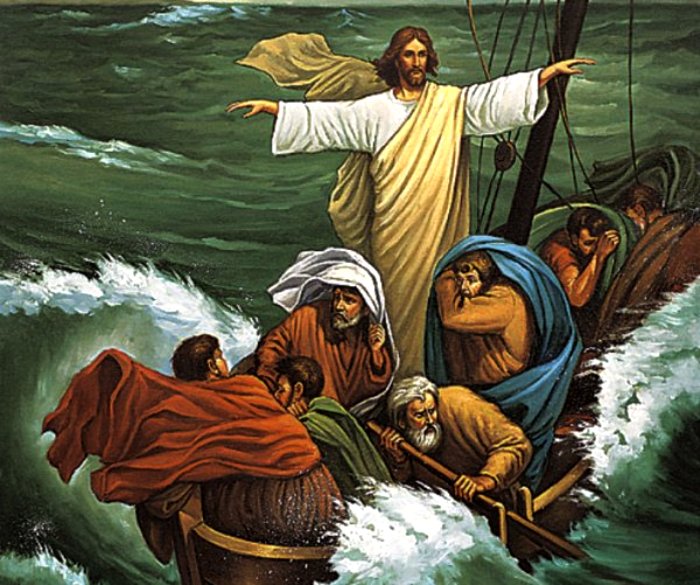Readings: Exodus 16:2–15 | Ephesians 4:1–16 | John 6:22–35
Text: Psalm 145:10-21; Ephesians 4:1-16
God always provides. This is something we acknowledge (most of the time) in our lives. We prayed earlier in Psalm 145,
15 The eyes of all look to you,
and you give them their
food in due season.
16 You open your hand;
you satisfy the desire of
every living thing.
And these are fitting words before sitting down for a meal, acknowledging that what we have, even if we bought it at Safeway, Winco, Walmart, is truly from God’s gracious hand, just as our Lord says, “Therefore do not be anxious, saying, ‘What shall we eat?’ or ‘What shall we drink?’ or ‘What shall we wear?’ 32 For the Gentiles seek after all these things, and your heavenly Father knows that you need them all.” (Matt. 6:31-32)

God always provides. It isn’t just a platitude, even if sometimes it’s used as a flippant way to brush off concern about how. This is a truth, and it is the antidote to anxiety about our needs in this world. As the Psalm continues:
18 The Lord is near to all who
call on him,
to all who call on him in
truth.
19 He fulfills the desire of
those who fear him;
he also hears their cry
and saves them.
20 The Lord preserves all
who love him
When we feel like the Lord is distant from our circumstances, He is truly near. If we worry that He will fall short on what we need, He fulfills our needs, hears their cry and saves them from all danger. When we are ready to throw up our hands, it is the Lord who preserves His people who love Him.
So all this we believe about God providing for all His creatures, and protecting us against anxiety and fear. And while this is an area we’re particularly vulnerable to worry, there is also another big blind spot for Christians. St. Paul writes to the Church in Ephesians 4:
I therefore, a prisoner for the
Lord, urge you to walk in a
manner worthy of the calling
to which you have been called,
2 with all humility and
gentleness, with patience,
bearing with one another in
love, 3 eager to maintain the
unity of the Spirit in the bond
of peace. 4 There is one body
and one Spirit—just as you
were called to the one hope
that belongs to your call—
5 one Lord, one faith, one
baptism, 6 one God and Father
of all, who is over all and
through all and in all.
Even though he was bound in prison because of preaching that Jesus is the Christ, Paul’s own eyes had seen the mighty power of God at work in the Church. He had heard the Spirit’s voice and witnessed His power to call through the Gospel of Jesus. By the power of God, Paul had been thrown down on the road to Damascus and had his whole life’s work turned around (Acts 9). The Churches had seen, that “He who once persecuted us is now preaching the faith which he once tried to destroy” (Gal. 1:23) He was the instrument of bringing scores of Gentile unbelievers to know the One True God—from those visiting synagogues to even the jailer at Philippi (Acts 16).

Suffice to say, St. Paul knows something about the calling of God to belong to Him as beloved children, and the gathering of His children into one Church. This is what befits those who are called by the Gospel: that we “walk in humility and meekness, with patience and bearing with one another in love, eager to maintain the unity of the Spirit in the bond of peace.” (vv. 2-3) This begins with realizing how gracious God is to call us into His Church, that there is no resume which made us rise above others. Rather, there was a record of debt that stood against us, but God took this and nailed it to the cross (Col. 2:14). We walk in humility or meekness, because we are not looking to draw attention to us or brag about our accomplishments, realizing there is nothing for us to boast about except in Jesus Christ crucified for us. And we are patient, trusting that all things happen as part of God’s eternal purpose. Just as He numbers all the hairs of our head, not one soul will enter into judgment apart from His knowledge and desire to save them.
We recognize that one thing we all have in common is we are all sinners in need of mercy and each with our own weaknesses and needs. So, we band together in mutual support, having compassion, praying for our brothers and sisters. Together, we also rejoice in the other thing we all have in common: Our merciful God whose Holy Spirit has knit the Church together, and it’s a joy when we can share this common bond with other Christians, no matter by what path they came to this bond of peace. Here is the truth that there are no denominations after this broken earth passes away, because “4 There is one body and one Spirit—just as you were called to the one hope that belongs to your call— 5 one Lord, one faith, one baptism, 6 one God and Father of all, who is over all and through all and in all.” And even though there are edifying reasons to be called Evangelical Lutheran, this is what we confess together, when we believe in “one holy, Christian [catholic], and apostolic Church” (Nicene Creed)

But this isn’t always what the Church looks like on earth, and that comes from the way we look at the Church. The time it’s hardest to see this in the Church is when we doubt that the Church is truly God’s creation. We think that it’s the work of our hands—our skillful manipulation, the pastor’s golden-mouthed sermons, having fun and engaging youth programs, what good stewards we are and how proud we are of holding no debt. But what this leads to is the very opposite of what St. Paul describes. Out of the church of our own hands comes a panoply of adulterations of Christ’s Church: We practice pride at what we have done or might do. We are arrogant to think we can improve upon the Means of Grace God has appointed. We are impatient with the fruit of the preached Word, which leads us to think He’s failing in our time and place (or self-flagellation that we’re doing it wrong). The church of our hands also finds more and more reasons to divide and ascertain who are “in” or “out” or who’s “doing church” the best.
Repent, all of us, for we have made an idol of God’s Church! “Return to the Lord your God, for he is gracious and merciful, slow to anger, and abounding in steadfast love; and he relents over disaster.” (Joel 2:13). And in returning to our mighty and loving God, we see again that the Church and our place in it is 100% His work, even if it should be carried out by human hands:
7 But grace was given to each
one of us according to the
measure of Christ’s gift.
8 Therefore it says, “When he
ascended on high he led a host
of captives, and he gave gifts to
men.”
9 (In saying, “He ascended,”
what does it mean but that he
had also descended into the
lower regions, the earth? 10 He
who descended is the one who
also ascended far above all the
heavens, that he might fill all
things.) 11 And he gave the
apostles, the prophets, the
evangelists, the shepherds and
teachers, 12 to equip the saints
for the work of ministry, for
building up the body of Christ,
God always provides for His Church from beginning to end. And because this is God’s Church, we marvel at how He does this. Just as we thank God for what He provides through government and grocery store, we also thank God for how He provides for His Church through human hands. He ascended on high and gave gifts to men: the gifts which are needed for growing His Church: the prophetic and apostolic Scriptures (remember, these are the foundation, Christ Jesus being the cornerstone, Eph. 2:20). He provides evangelists who preach this Word here and all over the world—some whose lives are devoted as missionaries (Paul, in addition to be an apostle was one), and others who share the faith in a number of ways in their daily interactions. But the Lord isn’t done. He also gives shepherd-teachers:[1] pastors who keep watch over people’s soul’s, study the Word, and teach all the saints (young and old).

Through these human workers, the Church is equipped, the work of ministry is accomplished, and the Body of Christ is built up.
13 until we all attain to the
unity of the faith and of the
knowledge of the Son of God,
to mature manhood, to the
measure of the stature of the
fullness of Christ, 14 so that we
may no longer be children,
tossed to and fro by the waves
and carried about by every
wind of doctrine, by human
cunning, by craftiness in
deceitful schemes. 15 Rather,
speaking the truth in love, we
are to grow up in every way
into him who is the head, into
Christ, 16 from whom the
whole body, joined and held
together by every joint with
which it is equipped, when
each part is working properly,
makes the body grow so that it
builds itself up in love.
Yes, it’s human hands which He uses, but it is the same Almighty Lord who is working in His Church. When we read about the Acts of the Apostles, we shouldn’t wish for the glory days of years past, wringing our hands like old men who dream about what we used to be able to do. With faith in the very same God, we believe that He is working in His Church in 2021 with the same powerful Word and Spirit as He did in generations before us.
In fact, we need to cling to this even more because we see the world gaining popularity and acceptance in its own wickedness. With each passing generation, it takes more intentionality and perseverance to belong to this Christian Church. If we look for the strength to do this in ourselves, there would be little to hope for. One time several pastors were subjected to a presentation where the Lutheran church was compared to the Titanic sinking. But this is not the fate of God’s Church, because even the gates of hell shall not prevail against God’s calling people to believe that Jesus is the Christ (Matt. 16:18).

But just as we have to work our jobs to have income, participate as citizens to have good government, and take care of our bodies to have good health, we also need to work in the Church. In order for the Church to be strong, it is our duty to take hold of the treasures God gives us, to read His precious Word, be ready to share the reason for the hope with us, and support the shepherd-teachers in our midst. So, this doesn’t exonerate us from work, but it does free us from worry.
So, to paraphrase the Lord Jesus, Therefore do not be anxious, saying, ‘How shall we be relevant?’ or ‘What can we do to make this old-fashioned religion last?’…“32 For the Gentiles seek after all these things, and your heavenly Father knows that you need them all. 33 But seek first the kingdom of God and his righteousness, and all these things will be added to you.”
In conclusion, let’s return to Psalm 145, and apply it to the Bread of Life, which our God gives to the world, and in which His Church delights:
10 All your works shall give
thanks to You, O Lord,
and Your saints shall bless
you!
11 They shall speak of the glory
of Your kingdom
and tell of your power.
12 to make known the children
of man your mighty deeds,
and the glorious splendor
of Your kingdom.
13 Your kingdom is an
everlasting kingdom,
and your dominion endures
throughout all generations
14 The Lord upholds all who are
falling
and raises up all who are
bowed down.
21 My mouth will speak the
praises of the Lord,
and let all flesh bless His
holy name forever and ever.
Amen!

[1] See ESV footnote after “teachers”



